A marketplace to integrate the existing ecosystem of volunteering with an intent to nudge citizens towards responsible behavior through gamification.
ENGAGE
Context
People make multiple choices every single day, knowingly or unknowingly based on criteria ranging from convenience, minimum hindrance, financial feasibility, time taken, etc. Now, these choices are generally very personal and while making these choices many people hardly think about the bigger picture of climate change, environment, etc. Currently, there is rarely has an alternative, and even if there is, it has issues related to accessibility, where the user often needs to put an extra conscious effort to avail these alternate choices. While there is no extra institutionalised acknowledgement of the conscious efforts taken, there are penalisation mechanisms which are targeted towards paying fines rather than behaviour change. With India being the second-most populous country in the world, the impact of practices focusing on behavioral change may increase manifold.
Since cities are recipients of migrants from all over the country, people tend to have a reduced sense of ownership with one’s surroundings. The sense of anonymity often alienates them, resulting in a decreased sense of responsibility. The idea is to inculcate a sense of belonging and promote a bottom-up approach to governance, therefore increasing citizen participation.
Internationally, there is 30-50% citizen participation in the top ten developed countries through volunteering. India fares at 1.5%. As a country with 1.3 billion citizens, there is a significant young demographic dividend willing to participate and be the change. Globally, 970 million people volunteer every year, which is equivalent to 125 million full-time workers and 2.4% of the global economy. 377 million people reside in urban India, considering a modest conversion rate of 10%, there is a huge untapped potential waiting to be explored. The numbers are compelling, it is indeed time to invest in our people, our strength, and our collective future.
Problem Statement
The administrative systems in India mostly depend upon penalizing mechanisms to monitor citizen behaviour while there are hardly any appreciation mechanisms to reinforce citizen participation. Lack of appreciation often acts as a disincentive, particularly when there is no accountability for the action taken whether good or bad to the mostly anonymous citizen. As citizens hustle towards financial stability and day-to-day activities, their quality time towards giving back to society constantly diminishes. With time constraints questions arise on how to contribute positively, all the while, to producing positive results for the community.
The project began with the question, “What can we do to increase citizen participation in urban India?”. Volunteering could be an answer, however, volunteers face hurdles in form of awareness and (in)convenience. There is a general willingness to be a part of something that is for the greater good provided there is no extra effort or cost (must follow the path of least resistance). On the other hand, volunteering organisations face the issue of discoverability, scalability and visibility.
Through extensive primary and secondary research, we identified that the issue lies in matchmaking, therefore, the team has come up with an engagement program that would create an integrator platform to bridge city administrators, volunteering organisations and citizens to nudge behavioural change in the functioning of city ecosystem.
Objective
Our vision is to make volunteering a way of life, a social norm; therefore, effortless, accessible, and gratifying for all Indians. Our mission is to empower every Indian to be a changemaker that will drive a positive change in their communities, then their cities and eventually in the country. It is imperative to have achievable objectives that lead to an overall nationwide vision:
- To facilitate a volunteer to access opportunities based on their interest, skill, time, location and reduce the functional hurdles.
- Connect organizations with enthusiastic volunteers, increase the probability of discoverability and scale their activities.
- To create a nationwide database for volunteering, represent it in quantifiable & relatable statistics and support decision making.
- To establish a rewarding mechanism in collaboration with private and government organisations to sustain citizen participation.
The idea is to create an ecosystem, a one-stop-shop for all stakeholders to collaborate and magnify the potential of existing initiatives. This platform can be accessed by any passionate individual committed to providing their enthusiastic service, and eventually progressing their community. It diminishes the hurdle of identifying volunteering opportunities while providing a wide spectrum of choices as per their interest, skill, time and location. The platform, a marketplace therefore aims to increase citizen participation in urban India.
Project Strategy
Pilot City Identification
The team’s idea does not essentially depend on specific datasets and is city agnostic. The goal is to engage citizens through an integrator platform. Although the project is a multi-stakeholder marketplace, the primary goal is to scale up “good behaviour”. The team has a crisp inventory of prerequisites to gauge the non-negotiables for city selection:
- Presence of a culture of volunteering,
- Awareness in citizens,
- Active NGOs/ NPOs/ government organisations,
- Willingness to solve city-level issues in collaboration with the government,
- Accessibility and adaptability to new technology, and
- Citizen participation at Ward Committee level.
The team started with a multiple criteria decision-making framework. However, choices remained limited when cities were shortlisted given the pandemic situation. Knowing the vibrant ecosystem of citizen participation and growth of the smart city, Mr. Kunal Kumar, the Joint Secretary of MoHUA selected the city of Bengaluru. Bengaluru has many volunteering organisations such as ‘Make a Difference’, ‘Team Hasiru’, ‘Heritage Beku’, ‘Janaagraha’, ‘United Way’, ‘Say Trees’ and many more which are actively engaged with volunteers for the development of the city.
Project Development and Implementation
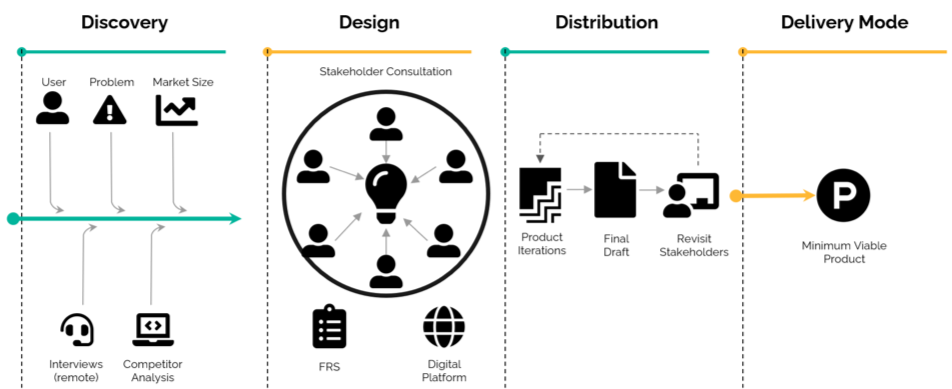
Expected Outcomes
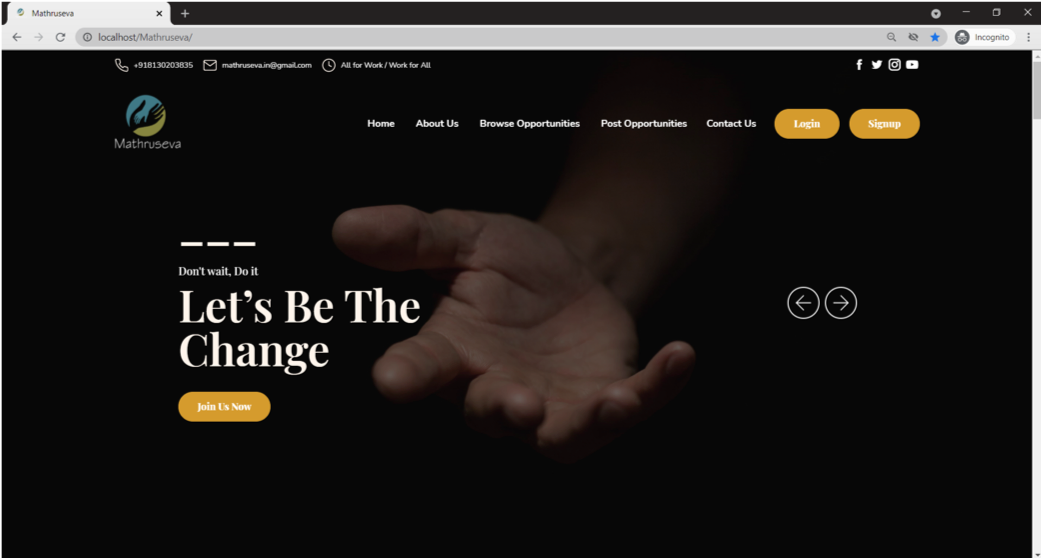
Integrator Platform: A multi-stakeholder marketplace for volunteers, NGOs/ NPOs, and Government Organizations to engage in volunteering, by reducing the efforts and hurdles of discoverability, accessibility and scalability.
Dashboard: Data visualisation in the form of a dashboard (at the national level, city level) helps monitor the overall activities taking place across the organisations and facilitates impact assessment.
Programme: To make Mathruseva a nationwide volunteering platform, it is necessary to support it with a toolkit, a rewarding framework (incentivization) and linking it with other national and state initiatives. The programme will encompass all the dimensions required to scale the platform.
Actual Result
Our product/ platform is called “Mathruseva”, which means serving one’s motherland. This resonates with the idea we want to propagate through the platform. Mathruseva is an aggregator platform, which resolves the hurdles on both volunteer and organisation end. Hence, the platform has an interactive user interface to facilitate the multiple stakeholders.
Social media integration will overcome the problem of awareness, whereas the rewarding mechanism will ensure the interest and motivation of volunteers. The flexibility in the timings and availability of online opportunities will ease the scheduling issue for volunteers and NGOs alike. Similarly, the catalogue of opportunities will make it easier for NGOs to be discovered for the activities. The hyperlocal solution of searching for an opportunity in your neighborhood would resolve the accessibility issue of volunteering opportunities.
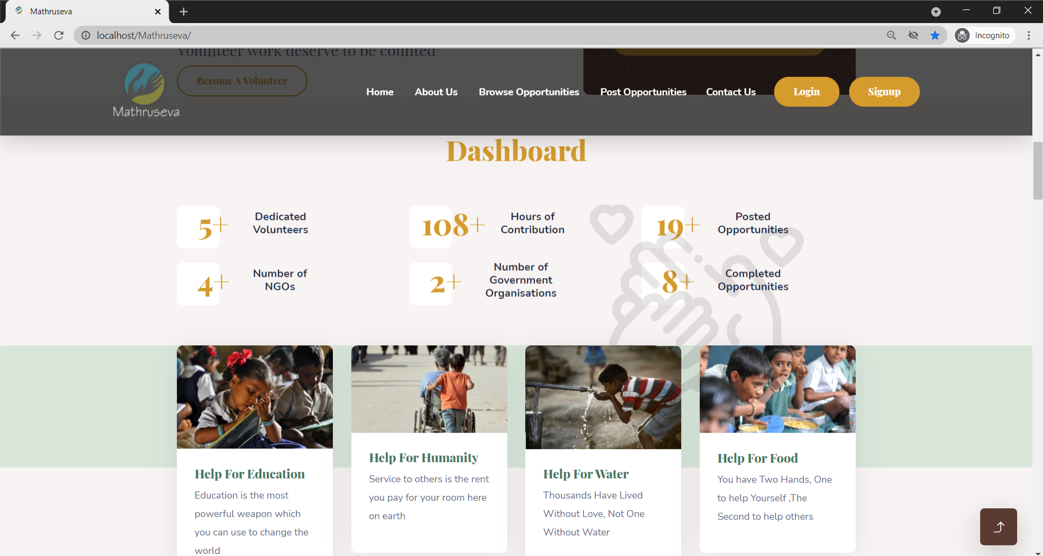
A live dashboard shows volunteer statistics such as the number of active participants, ongoing activities, registered NGOs, hours of contribution, and many more.
Mathruseva is a sector agnostic platform, which allows interactions between all stakeholders who want to be engaged with volunteering. This flexibility gives volunteers a wide array of activities to choose from.
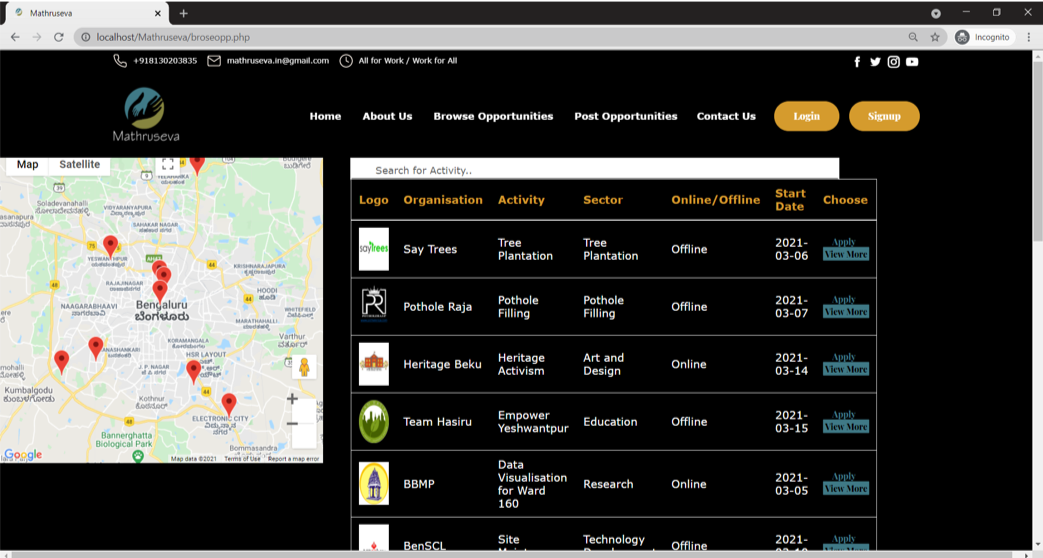
When a volunteer is curious and interested in discovering the opportunities available in the vicinity for them, they can open the “Browse Opportunities” tab which shows a catalogue of available opportunities vis a vis a location, proximity to the location, and other filters. This makes it simpler for the volunteer to choose the activity they are interested in. The solution would be hyperlocal with a possibility of selecting a Ward or radius of distance to volunteer within.
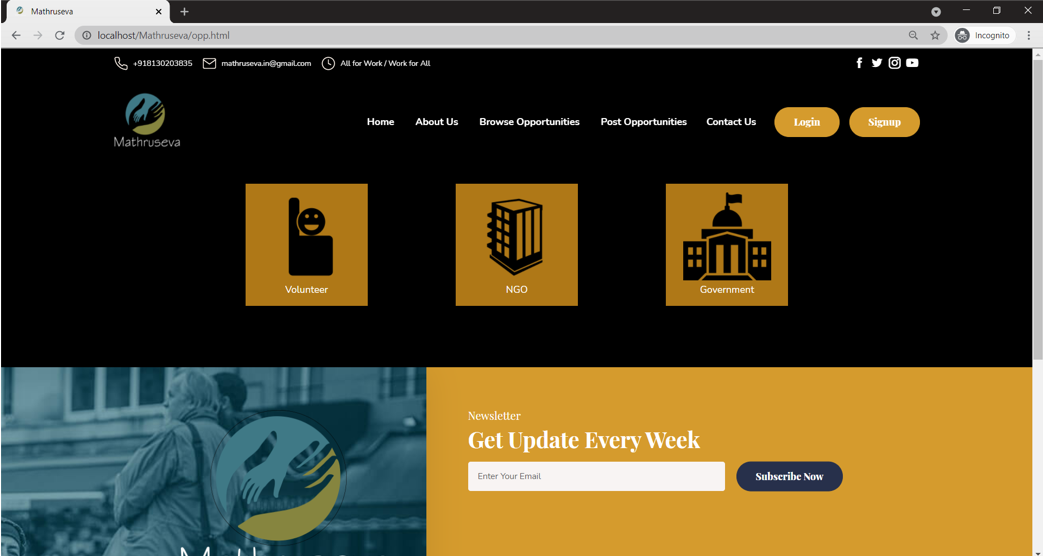
Mathruseva allows interactions between volunteers, NGOs/NPOs, and Government organisations in the phase I, however, additional stakeholders like institutions and CSRs for a wholesome ecosystem of volunteering will be added in phase II.
Signing up/in on the website is only required when the user wants to perform a transaction through the website.

Volunteers are vetted based on their credentials and then they can log in to the platform. On the volunteer interface, the dashboard will show the individual footprint, and the top 5 volunteering organisations based on volunteer feedback.
The volunteer will be able apply for the opportunity once they have completed the user profile with preferences and other social media handles for seamless sharing.

The volunteer interface has multiple tabs on the navigation bar through which they can browse opportunities, apply for them, get updates on the applied opportunities, view the feedback & rating received from hosting the organisation and rewards earned based on the hours of contribution. The platform uses gamification in terms of social media integration and rewarding mechanism to scale good behaviour. The rewards would act as social currency and could be redeemed against an array of benefits.

An organisation can post opportunities through the platform which will be visible to volunteers in real time. The organisations can specify various details on the page including the skills they desire in volunteering candidate and if they require to get trained to be a part of activity. Some of the social and educational sector organisations prefer long term volunteers as they are going to interact with sensitive section of society. The organisation even choose to offer online opportunities for fixed rewards.
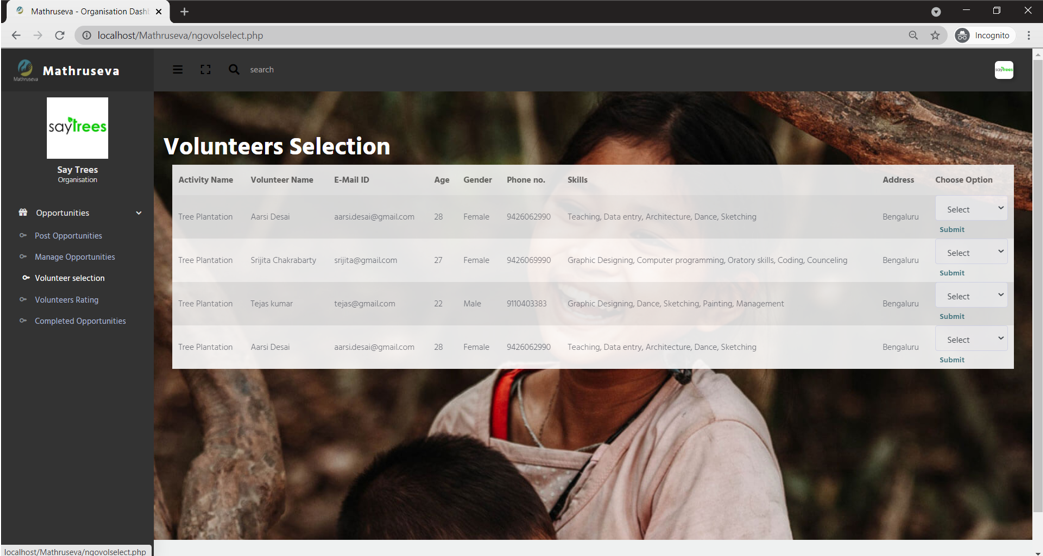
The navigation bar in the organisation interface will help maneuver through Managing opportunities, volunteer selection, volunteer rating and completed opportunities. The organisation would be able to select volunteers based on their skills and other credentials. As soon as the volunteer is selected, they would be notified about the same. The two-way rating ensures ethical practice and conduct on both end and help other users to make a decision based on the same.
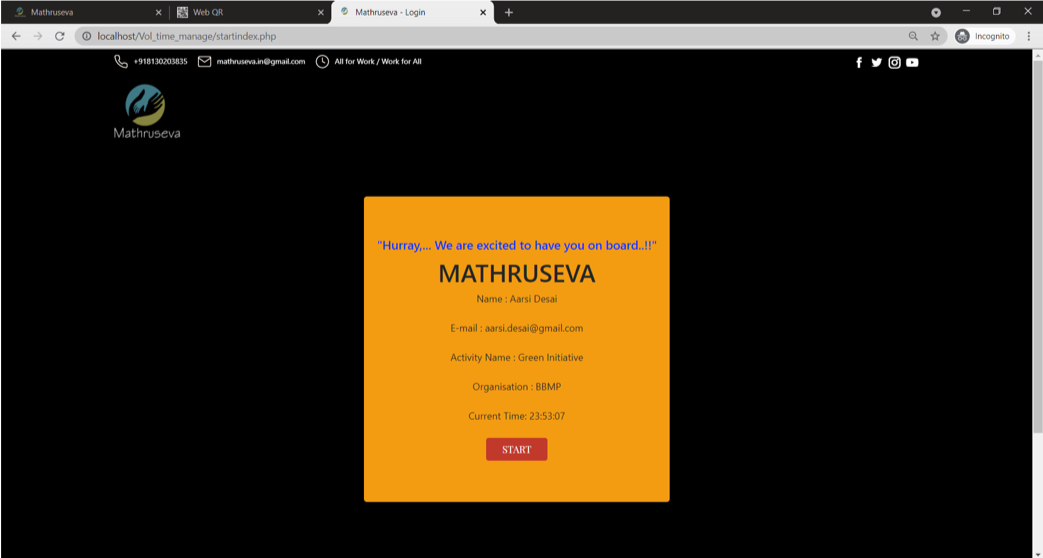
Once the volunteer reaches the activity location, they would have to scan a QR code to start the activity, this would send time & location stamp to Mathruseva as well as the hosting organisation for calculating time of participation. The rewarding mechanism is time based i.e., each hour of volunteering will equal to 10 reward points, this essentially is social currency that helps gamify the experience of user. This eliminates bias, if any.

Once the volunteer has finished the activity on site, they will scan an ending QR code which will then allow them to give feedback to the hosting organisation. This will again share the time & location stamp to the concerned organisations. This acts as feedback loop for the platform as well as the hosting organisation.

nce the activity is over, the volunteer can share the activity through their social media handles. This will help garner interest for the platform itself and the activity through peer-to-peer sharing and word of mouth.
This is a gamifying element. Gamification is the application of game-design elements and game principles to non-game contexts.
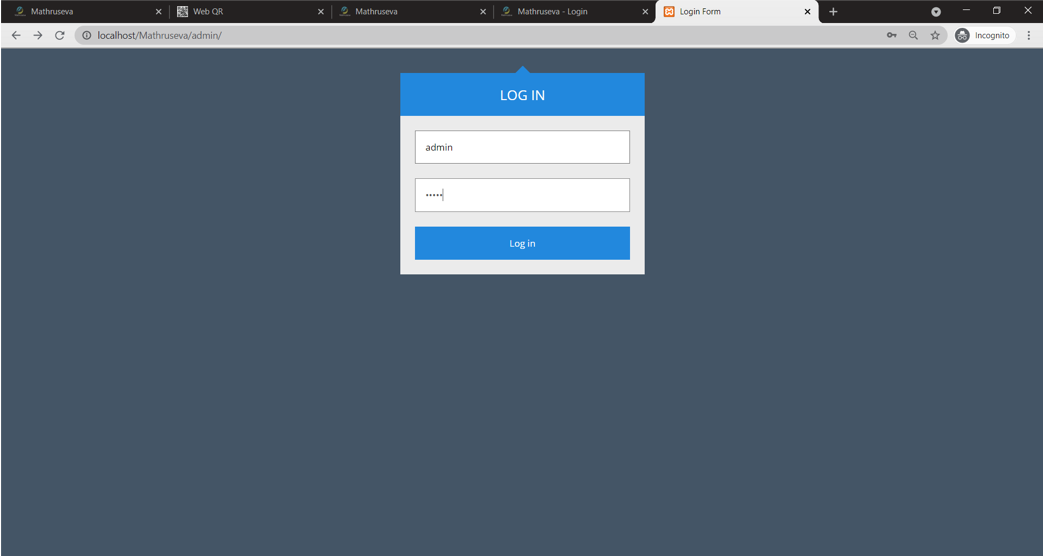
The platform will have an additional interface for website administrator. This could be monitored by the owner of website which is MoHUA, NIUA or BBMP.
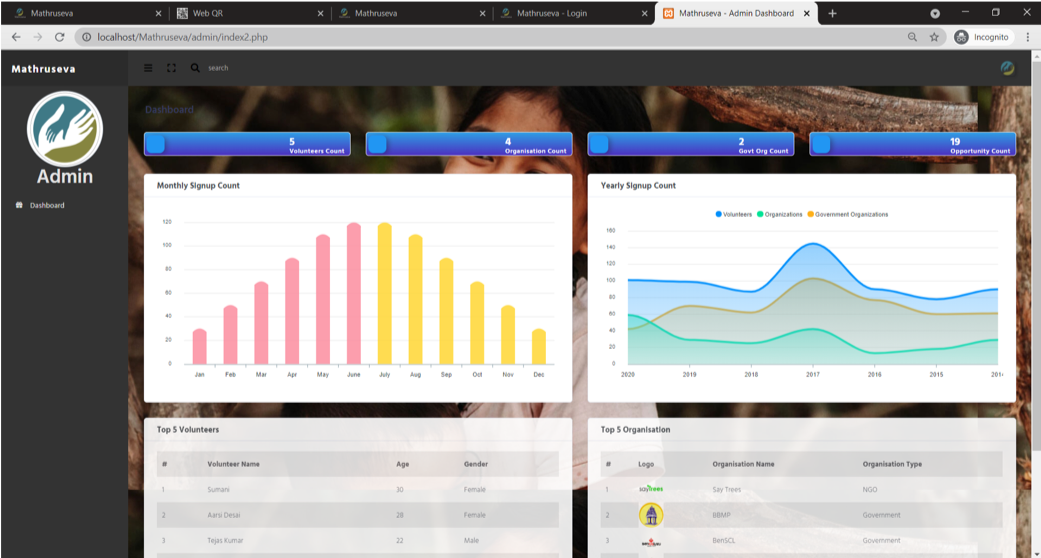
From the owner or super administrator’s perspective, the overall statistics, trends and patterns of practice becomes very important. A quick dashboard could share information such as top five sectors, top five organisations, peak days of activity, seasons of volunteering and many more as required. This will help the administrator to mobilize resources in a more efficient manner and support informed decision making. This interface will have a dynamic dashboard for decision makers as well as detailed inventory of all activities.
Conclusion
Mathruseva is a simple, city agnostic marketplace, to bridge the gap between volunteers and volunteer organisations. The product has been designed to have a hyperlocal outlook which can be replicated and scaled up anywhere in the country much like Swiggy, LinkedIn, and many other aggregating platforms. The product enables users to access the volunteering opportunities in their neighbourhood to minimize their efforts in searching opportunities and maximize the volunteering output.
The way forward is stakeholder onboarding for hand holding first few transactions; establishing a mature rewarding mechanism with acceptance from private and government organisations; Government-to-Business solutions for facilitating two-way transactions between the stakeholders; adding new stakeholders such as Corporate Social Repsonsibility, colleges and educational institutes who have shown promise on the platform; and raising awareness in form of podcasts, interviews and workshops to support the platform.








